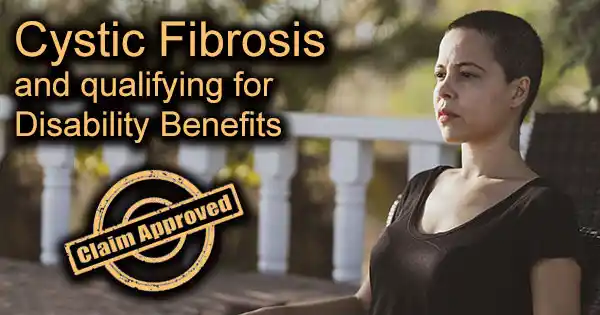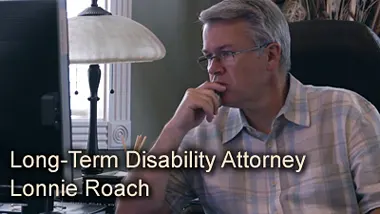Cystic Fibrosis and Qualifying for Social Security Disability Benefits
Can I get disability benefits if I am suffering from the effects of Cystic Fibrosis?
Author: Attorney Lonnie Roach
Updated: 10/8/2024
Summary: Can I get disability benefits if I am suffering from the effects of Cystic Fibrosis?
First you must meet the SSA’s financial requirement: You must have worked long enough, recently enough, and not made over a predetermined level of income.
Second you must meet the medical requirements:
The Social Security Administration recognizes cystic fibrosis as a serious impairment in its Blue Book under Section 3.04.
To qualify for automatic approval of disability benefits an applicant must provide evidence of one of the following:
- A breathing test (Spirometry test) result that indicates a low FEV1. or
- At least three hospitalizations of any length within the previous 12 months, occurring at least 30 days apart; or
- Collapsed lung caused by CF and requiring chest tube placement; or
- Respiratory failure requiring invasive mechanical ventilation, noninvasive ventilation with BiPAP, or a combination of the two treatments, for a minimum of 48 hours, or 72 hours after surgery; or
- Pulmonary hemorrhage with vascular to control bleeding; or
- A low oxygen reading (SpO2) of 89% or below or
- Two of the following serious complications:
- Pulmonary exacerbation requiring 10 consecutive days of intravenous antibiotic treatment,
- Pulmonary hemorrhage requiring hospitalization of any length,
- Weight loss requiring daily supplemental enteral nutrition, or
- CF related diabetes requiring insulin therapy for at least 90 consecutive days.
- Pulmonary exacerbation requiring 10 consecutive days of intravenous antibiotic treatment,
- Pulmonary hemorrhage requiring hospitalization of any length,
- Weight loss requiring daily supplemental enteral nutrition, or
- CF related diabetes requiring insulin therapy for at least 90 consecutive days.
If you cannot meet the listing requirements you may still qualify if your functional limitations prevent you from doing any job.
The Social Security Administration recognizes cystic fibrosis as a serious impairment in its Blue Book under Section 3.04. Applicants with cystic fibrosis are eligible for automatic approval of disability benefits if they suffer from poor lung function and repetitive lung infections.

The SSA recognizes Cystic Fibrosis in its Blue Book under Section 3.00-Respiratory. To qualify for Social Security Disability benefits a person must meet the requirements of the listing or prove that they are unable to work.
Cystic Fibrosis (CF) affects 30,000 people in the U.S.
CF is a progressive inherited disease that causes repetitive lung infections and limits a person’s ability to breath over time. Because of early diagnosis and new therapies, people who suffer with this disorder are now able to live longer lives.
Cystic fibrosis affects not only the respiratory system, but other organs of the body as well resulting in a variety of symptoms and possible complications.
Common symptoms include:
- Frequent lung infections
- Trouble breathing
- Persistent cough that produces thick mucus
- Repetitive sinusitis
- Exercise intolerance
- Inflamed nasal passages and stuffy nose
- Trouble growing or gaining weight
- High level of salt in sweat
- Chronic constipation
Complications of CF which may develop affect the respiratory, digestive, and reproductive systems of the body:
- Bronchiectasis, a condition where the bronchial tubes are permanently damaged
- Collapsed lung
- Respiratory failure
- Nasal polyps
- Coughing up blood
- Sleep apnea
- Diabetes
- Liver disease
- Nutritional deficiencies
- Intestinal blockage
- Infertility
These conditions and accompanying symptoms can affect your ability to maintain employment.
Cystic Fibrosis and Qualifying for Disability Benefits.
As patients with CF become older, they may experience more lung infections and problems breathing.
The Social Security Administration recognizes cystic fibrosis as a serious impairment in its Blue Book under Section 3.04. Applicants with cystic fibrosis are eligible for automatic approval of disability benefits if they suffer from poor lung function and repetitive lung infections.
To qualify for automatic approval of disability benefits an applicant must provide evidence of one of the following:
- A breathing test (Spirometry test) result that indicates a low FEV1. An FEV1 is a measurement of the amount of air a person can exhale from the lungs; or
- At least three hospitalizations of any length within the previous 12 months, occurring at least 30 days apart; or
- Collapsed lung caused by CF and requiring chest tube placement; or
- Respiratory failure requiring invasive mechanical ventilation, noninvasive ventilation with BiPAP (a method of breathing support), or a combination of the two treatments, for a minimum of 48 hours, or 72 hours after surgery; or
- Pulmonary hemorrhage (bleeding from the lung) with vascular embolization (placement of a tube into an artery or vein) to control bleeding; or
- A low oxygen reading (SpO2) of 89% or below (lower for those living at high altitude). Low oxygen must occur at least twice in the same 12-month period under consideration and at least 30 days apart; or
- Two of the following serious complications: pulmonary exacerbation requiring 10 consecutive days of intravenous antibiotic treatment, pulmonary hemorrhage requiring hospitalization of any length, weight loss requiring daily supplemental enteral nutrition, or CF related diabetes requiring insulin therapy for at least 90 consecutive days.
If you have cystic fibrosis, but your disability does not meet the requirements of Social Security’s listing, you may still be approved for disability benefits.
For example, if you are unable to hold full-time employment because you frequently need time away from your job during the day to undergo treatments for CF, or because of your medical condition, you must avoid dust, fumes and temperature extremes, Social Security may find your limitations prevent full-time work and deem you disabled. Also, applicants often have more than one illness or injury that prevents them from working full time. By itself one disorder may not meet the requirements of an impairment as stated in Social Security’s Blue Book, but if you have other medical conditions, such as diabetes or high blood pressure, Social Security will consider how those health issues, combined together, limit your ability to hold a job and perform necessary daily tasks. Social Security will also evaluate how your limitations affect your ability to work (called a medical-vocational assessment), taking into account whether or not you are able to drive, your age, and level of education.
Once Social Security determines the limitations caused by your condition, they will employ a vocational expert to assess whether a person with these limitations is employable.
If you are 55 or older or have another medical condition you may get approval.
Social Security follows a set of rules to determine when the agency expects an applicant to learn a new job.
Applicants who are 55 or older often fall under a grid rule, which means they are not expected to learn a new job. For example, a 55-year-old applicant with no transferable skills might be found disabled. If you can’t go back to your old job, and you don’t have the skills to learn a new one, Social Security will likely grant you disability benefits.
Social Security also has basic financial requirements.
Before you are eligible for Social Security disability benefits, you must satisfy some basic financial requirements.
You must: 1) have a disability that has lasted or is expected to last 12 months; and 2) you must have worked in a job where you paid Social Security taxes long enough and recently enough; and 3) you must not earn more than Substantial Gainful Activity (SGA), which is $1,550 per month in 2024 for nonblind applicants and $2,590 per month for blind applicants.
What if I don’t qualify for SSDI?
If you haven’t worked long enough to earn enough work credits, or if you earn too much income, you may be eligible for disability benefits through another Social Security program, such as Supplemental Security Income (SSI), or from a long-term disability insurance plan through your employer or a privately purchased policy.
SSI is a program that pays monthly benefits to people with limited income and resources who are disabled, blind, or age 65 or older. SSI is based on income instead of work credits, and is financed by general funds of the U.S. Treasury.
I have long-term disability insurance – should I file a claim?
Yes, you should file a claim as soon as you become disabled.
Long-term disability insurance (LTD) is coverage that protects your income if you are unable to work due to illness or injury and is purchased as part of a group employment plan or privately through an insurance company. Policies pay between 50-60% of your salary and benefits continue until you return to work or for the number of years stated in the policy. However, LTD coverage is good only as long as you are employed, so do not quit your job before you file a claim, and be sure to check your policy’s definition of “disabled” as each policy will state the definition of “disabled” which is in use. Additionally, be aware that long-term disability insurance companies can require a claimant to also apply for SSDI.
How do I file for Social Security Disability benefits?
You can apply for Social Security Disability benefits online, over the phone, or in person at your local Social Security Administration office.
If your initial application is denied, don’t be discouraged. Approximately 65% of initial applications are denied, but you will have the opportunity to appeal.
There are four steps to the Social Security appeal process:
- File a Request for Reconsideration with the Social Security Administration to completely review the case.
- If you don’t agree with SSA’s response to your Request for Reconsideration, you can request a hearing before an Administrative Law Judge (ALJ). ALJs are attorneys who work for the Social Security Administration; they review SSDI cases and either uphold or overturn decisions to deny SSDI benefits. If you are not represented by an attorney at this point, now is the time to obtain legal counsel. This is a critical point in the process and will raise your chance for success.
- If an ALJ does not grant your claim, you can request that the Appeals Council review your case.
- Federal Court review. The final step in the appeal process is filing suit in U.S. District Court.
If you have cystic fibrosis and your medical condition has impacted your ability to work, you may be eligible for Social Security Disability benefits.
Disability benefits are an important source of income for those who are unable to work. If you are not able to work due to accident or illness, you may be eligible for Social Security Disability or Long Term Disability benefits. If you have applied for benefits and been denied, contact the attorneys at Bemis, Roach and Reed for a free consultation. Call 512-454-4000 and get help NOW.
Try these links for further reading on this subject:
Social Security Disability Benefits for Chronic Obstructive Pulmonary Disease
Texas Lung Cancer Social Security Lawyers
Social Security Attorneys


![]()
Your Free Initial Consultation
Call now:
At Bemis, Roach and Reed, if we can't help you, we will try to find the right attorneys for you.
We offer each of our prospective clients a free no obligation one hour phone or office consultation to see if we can help you and if you are comfortable with us. We know how difficult a time like this can be and how hard the decisions are. If we can be of assistance to you and help you find a solution to your issue we will even if that means referring you to another attorney.
Let's get you Started:
If you could provide us with some basic information about your claim we will get right back with you with a free case evaluation and schedule your Free Consultation Today.






